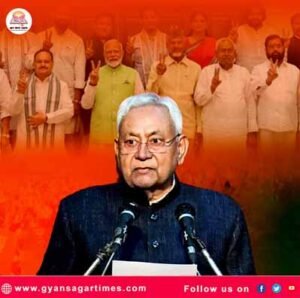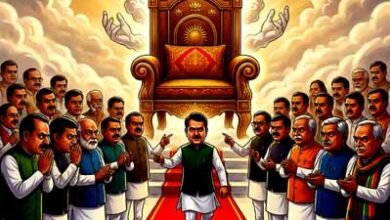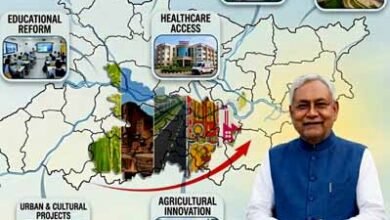
राजनीतिक यात्रा से ‘रणनीतिकार’ तक…
ऐतिहासिक धरती पर इतिहास बनते हुए देखना व साक्ष्य बनना सुनने में जितना कर्णप्रिय लगता है उससे कहीं ज्यादा महसूस करना. 20 नवंबर 2025 दिन गुरुवार, मार्गशीर्ष माह के कृष्ण पक्ष की अमावस्या तिथि को पटना के ऐतिहासिक गाँधी मैदान में बिहार की राजनीती में एक इतिहास बना. वो क्षण था… नीतीश कुमार का दसवीं बार मुख्यमंत्री पद की शपथ लेना. इस मौके पर पीएम मोदी सहित एनडीए के सम्मानित गणमान्य सदस्यों सहित आम-आवाम भी मौजूद थे.
नीतीश कुमार का जन्म हरनौत (कल्याण बिगहा) नालन्दा, में हुआ था. उनके पिता कविराज राम लखन एक आयुर्वेदिक वैद्य थे. उन्होंने विद्युत अभियांत्रिकी में उपाधि हासिल की. उनका राजनीतिक कैरियर वर्ष 1970 के दशक के जेपी आंदोलन से शुरू हुआ. उन्होंने जल्दी ही समाजवादी राजनीति में अपनी जगह बनाई. वर्ष 1985 में विधायक बनने के बाद, उन्होंने वर्ष 1989 में लोकसभा चुनाव जीता और वीपी सिंह और अटल बिहारी वाजपेयी के नेतृत्व वाली सरकारों में केंद्रीय मंत्री (कृषि राज्य मंत्री, रेल मंत्री) के रूप में कार्य किया.यह अनुभव उन्हें राष्ट्रीय राजनीति की बारीकियों से परिचित कराता है.
वर्ष 2005 में, उन्होंने राष्ट्रीय जनता दल (RJD) के 15 साल के शासन को समाप्त करते हुए, भारतीय जनता पार्टी (BJP) के साथ गठबंधन में सरकार बनाई. इस दौर में उन्हें ‘सुशासन बाबू’ की छवि मिली. नीतीश कुमार ने बार-बार राजनीतिक पाला बदला है, जिसने उनके कैरियर को अद्वितीय बना दिया है. वो एनडीए (भाजपा के नेतृत्व वाला गठबंधन) और महागठबंधन (राजद, कांग्रेस आदि के नेतृत्व वाला गठबंधन) दोनों का हिस्सा रहे हैं.
नीतीश कुमार के लंबे कार्यकाल की प्रमुख उपलब्धियां मुख्य रूप से वर्ष 2005 के बाद के उनके पहले कुछ कार्यकालों में केंद्रित हैं, जहां उन्होंने कानून-व्यवस्था और बुनियादी ढांचे पर ध्यान केंद्रित किया. वर्ष 1990 के दशक दशक के ‘जंगलराज’ की छवि को बदलने के लिए उन्होंने कानून-व्यवस्था में प्रभावी सुधार किए साथ ही सड़क, बिजली, स्वास्थ्य और शिक्षा जैसे बुनियादी ढांचे में उल्लेखनीय सुधार हुआ. गाँवों को सड़कों से जोड़ने पर विशेष ध्यान दिया गया.
उन्होनें, महिलाओं को 50% का पंचायती राज व्यवस्था में महिलाओं को पचास प्रतिशत आरक्षण, सरकारी नौकरी में महिलाओं को पैंतिस प्रतिशत आरक्षण दिया साथ ही साइकिल योजना के तहत लड़कियों को स्कूल जाने के लिए प्रोत्साहित किया. उन्होनें राज्य में शराबबंदी लागू की. रिकॉर्ड संख्या में शपथ लेने के बावजूद भी राज्य में प्रति व्यक्ति आय देश के औसत से काफी कम है. गरीबी और बेरोजगारी अभी भी राज्य की सबसे बड़ी समस्याएँ हैं. वर्तमान समय तक शिक्षा और रोजगार के अवसरों की कमी के कारण बिहार से पलायन एक गंभीर चुनौती बना हुआ है.
शराबबंदी के कारण अवैध शराब का कारोबार बढ़ा है और इससे राजस्व का नुकसान हुआ है, साथ ही अदालतों पर बोझ भी बढ़ा है. वर्षों तक सत्ता में रहने के कारण, उन्हें सत्ता विरोधी लहर का सामना करना पड़ा है, जिसके कारण उनकी पार्टी जदयू को सीटों के मामले में गठबंधन के अन्य सहयोगियों पर अधिक निर्भर रहना पड़ा.
नीतीश कुमार का 10वीं बार मुख्यमंत्री पद की शपथ लेना एक रिकॉर्ड है, जो उनकी अटूट राजनीतिक स्वीकार्यता और महत्व को दर्शाता है. यह संख्या भले ही उनकी राजनीतिक दीर्घायु और बिहार की राजनीति में उनके अपरिहार्य होने को सिद्ध करती है, लेकिन साथ ही यह बिहार की गठबंधन राजनीति की अस्थिर प्रकृति को भी उजागर करती है. हर बार के पाला बदलने ने उन्हें सत्ता में बनाए रखा है, लेकिन राजनीतिक विश्वसनीयता पर सवाल भी उठाए हैं. यह शपथ ग्रहण यह भी दिखाता है कि बिहार की राजनीति में सत्ता का संतुलन स्थापित करने के लिए जनता दल (यूनाइटेड) और नीतीश कुमार अब भी केंद्रीय स्तंभ हैं, भले ही उनकी पार्टी की सीटों की संख्या कम क्यों न हुई हो.
नीतीश कुमार का 10वीं बार मुख्यमंत्री बनना, भारतीय लोकतंत्र में क्षेत्रीय नेताओं की ताकत और अपरिहार्यता का प्रतीक है. उन्होंने बिहार को वर्ष 1990 के दशक की अराजकता से निकालकर सुशासन और विकास की पटरी पर लाने का श्रेय हासिल किया है, लेकिन वे राज्य की मूलभूत आर्थिक चुनौतियों, जैसे गरीबी, औद्योगिक विकास और बड़े पैमाने पर रोजगार सृजन को निर्णायक रूप से हल करने में सफल नहीं हो पाए हैं. उनकी विरासत सुधारवादी प्रशासक और रणनीतिक गठबंधन प्रबंधक के बीच फंसी हुई है. यह नया कार्यकाल उनके लिए एक मौका है कि वे अपने रिकॉर्ड को केवल शपथ ग्रहणों की संख्या तक सीमित न रखें, बल्कि बिहार को एक तेज गति से विकास के रास्ते पर लाने की दिशा में एक निर्णायक कदम उठाएं.
संजय कुमार सिंह.
(पोलिटिकल, सहायक एडिटर) ,
ज्ञानसागरटाइम्स.
========== ========= ===========
From a political journey to a ‘strategist’…

Watching and witnessing history being made on this historic land is more than just a pleasant experience. On Thursday, November 20, 2025, on the new moon day of the Krishna Paksha (dark fortnight) of the month of Margashirsha, history was made in Bihar politics at the historic Gandhi Maidan in Patna. That moment was Nitish Kumar taking the oath of office as Chief Minister for the tenth time. Prime Minister Modi, respected NDA dignitaries, and the general public were present on the occasion.
Nitish Kumar was born in Harnaut (Kalyan Bigha), Nalanda. His father, Kaviraj Ram Lakhan, was an Ayurvedic physician. He earned a degree in electrical engineering. His political career began with the JP movement of the 1970s. He quickly established himself in socialist politics. After becoming an MLA in 1985, he won the Lok Sabha elections in 1989 and served as a Union Minister (Minister of State for Agriculture, Minister of Railways) in the governments led by V.P. Singh and Atal Bihari Vajpayee. This experience familiarized him with the nuances of national politics.
In 2005, he formed a government in coalition with the Bharatiya Janata Party (BJP), ending the 15-year rule of the Rashtriya Janata Dal (RJD). This period earned him the image of “Sushasan Babu.” Nitish Kumar’s frequent political shifts have made his career unique. He has been part of both the NDA (BJP-led alliance) and the Grand Alliance (a coalition led by the RJD, Congress, etc.).
The major achievements of Nitish Kumar’s long tenure are primarily concentrated in his first few terms after 2005, where he focused on law and order and infrastructure. To change the image of “jungle raj” of the 1990s, he implemented effective law and order reforms, as well as significant improvements in infrastructure such as roads, electricity, health, and education. Particular attention was paid to connecting villages with roads.
He provided 50% reservation for women in the Panchayati Raj system, 35% reservation for women in government jobs, and encouraged girls to attend school through a bicycle scheme. He implemented prohibition in the state. Despite a record number of oath-takings, the state’s per capita income remains significantly lower than the national average. Poverty and unemployment remain the state’s major problems. Migration from Bihar remains a serious challenge today due to a lack of education and employment opportunities.
Prohibition has led to a rise in the illegal liquor trade, leading to revenue losses and a burden on the courts. During his years in power, he faced an anti-incumbency wave, forcing his party, the JDU, to rely increasingly on other coalition partners for seats.
Nitish Kumar’s swearing-in as Chief Minister for the 10th time is a record, reflecting his unwavering political acceptance and importance. While this number proves his political longevity and his indispensability in Bihar politics, it also highlights the volatile nature of coalition politics in Bihar. His frequent shifts have kept him in power but also raised questions about his political credibility. This swearing-in also demonstrates that the Janata Dal (United) and Nitish Kumar remain central pillars of power balance in Bihar politics, even though his party’s seat count has declined.
Nitish Kumar’s 10th Chief Ministership symbolizes the power and indispensability of regional leaders in Indian democracy. He has earned credit for leading Bihar out of the chaos of the 1990s and onto the path of good governance and development, but he has not been able to decisively address the state’s fundamental economic challenges, such as poverty, industrial growth, and large-scale job creation. His legacy remains caught between that of a reformist administrator and a strategic coalition manager. This new term is an opportunity for him to not limit his record to just the number of oath-takings, but to take a decisive step towards putting Bihar on the path of rapid development.
Sanjay Kumar Singh.
(Political, Assistant Editor),
Gyansagartimes.





